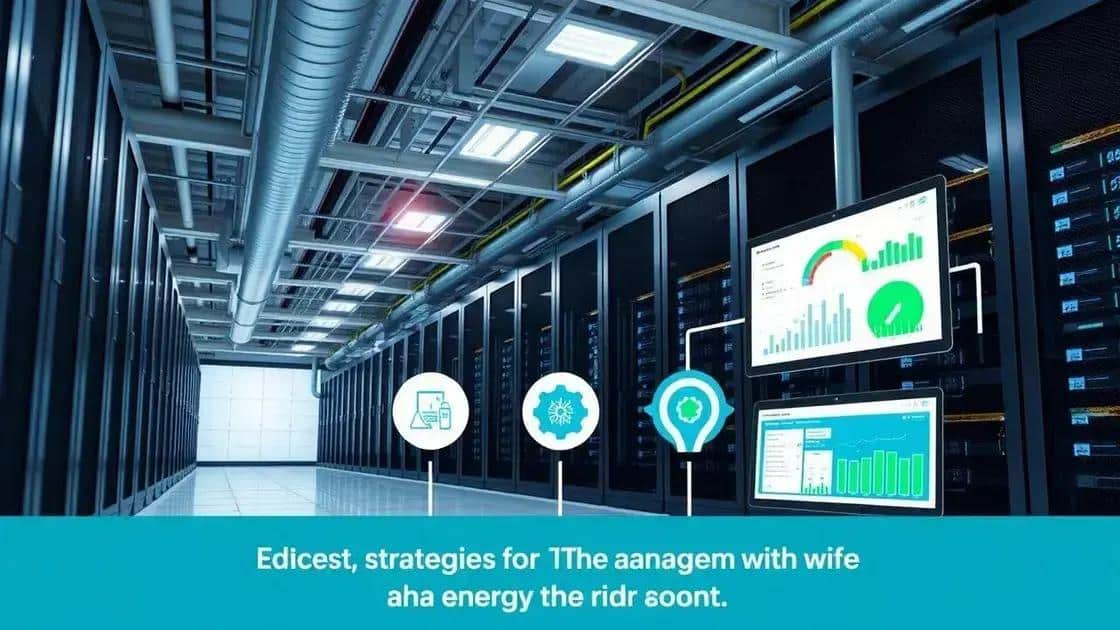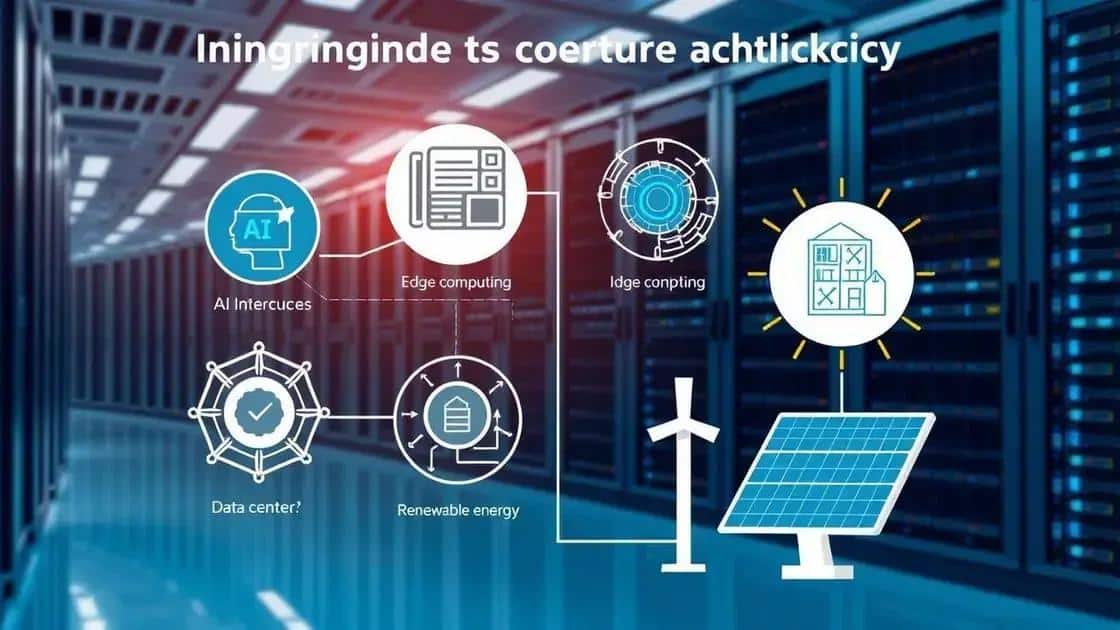Insights on data center efficiency news: maximize performance

Data center efficiency can be significantly enhanced through emerging technologies like AI, cloud solutions, and automation, leading to improved performance, cost savings, and reduced energy consumption.
Insights on data center efficiency news are essential for anyone looking to improve their operations. Are your data centers optimized for performance and sustainability? Let’s dive into what’s new and how you can benefit.
Understanding data center efficiency metrics
Understanding data center efficiency metrics is crucial for organizations aiming to optimize their IT infrastructure. These metrics help assess how well data centers perform regarding energy use, operations, and overall effectiveness.
Key efficiency metrics
There are several important metrics that can provide insights into the performance of a data center. Here are some widely used ones:
- PUE (Power Usage Effectiveness): This ratio compares total building energy usage to the energy used by the IT equipment alone.
- DCiE (Data Center Infrastructure Efficiency): This metric is the inverse of PUE and represents the efficiency of the data center infrastructure.
- WUE (Water Usage Effectiveness): This measures the amount of water used for cooling compared to the energy consumption.
- COP (Coefficient of Performance): This metric gives an idea of how efficiently cooling systems operate.
Monitoring these metrics can lead to better energy management and lower operational costs. For example, a lower PUE indicates that a data center is utilizing energy more efficiently. This not only reduces costs but also has a positive impact on the environment.
Analyzing the metrics
To effectively analyze these metrics, data center operators should regularly track them and compare them against industry benchmarks. This comparison allows organizations to identify areas for improvement. When a data center achieves a PUE close to 1.0, it means that almost all the energy used is being consumed by the IT equipment. On the contrary, a higher PUE suggests that a significant portion of energy is going towards non-IT operations, such as cooling.
Regular audits are also necessary to assess performance. Data centers should engage in periodic assessments to ensure that their efficiency metrics are aligned with organizational goals.
Understanding data center efficiency metrics goes beyond mere observation. It involves strategic planning and active management to drive improvements. With the rise of cloud solutions and virtualization, monitoring these metrics has become even more vital. Adopting best practices will not only enhance operational performance but also foster sustainability efforts.
Strategies for enhancing energy efficiency

Strategies for enhancing energy efficiency in data centers can lead to significant cost savings and sustainable practices. Implementing effective strategies is essential for improving performance while reducing energy consumption.
Best practices for energy efficiency
Several strategies can help boost the energy efficiency of a data center:
- Optimize cooling systems: Use hot aisle/cold aisle containment to maximize cooling efficiency.
- Utilize virtualization: Reducing the number of physical servers by using virtual machines can lower energy consumption significantly.
- Invest in energy-efficient equipment: Selecting hardware that meets Energy Star certification can make a big difference.
- Implement automation: Automating environmental controls can optimize energy usage and improve operational efficiency.
By prioritizing these practices, organizations can see a marked improvement in their overall energy profile. For instance, optimizing cooling systems not only enhances system performance but also curtails energy costs. Furthermore, virtualization plays a critical role in navigating energy consumption. By minimizing the number of active servers, data centers can maintain or even enhance service levels at a fraction of the energy costs.
Monitoring energy usage
Regularly monitoring energy usage is vital in determining the effectiveness of these strategies. Utilizing energy management software can provide real-time insights into energy consumption levels. Understanding these patterns allows data center managers to make informed decisions. In addition to software tools, hardware solutions like smart meters can track energy use and help identify trends over time.
Additionally, conducting regular energy audits helps ensure that implemented strategies are effective and revealing opportunities for further improvements. These audits assess how much energy is being consumed and where the biggest savings can be achieved. By linking energy efficiency strategies to measurable outcomes, organizations can justify investments in modernizing their infrastructure.
The impact of cloud solutions on data center performance
The impact of cloud solutions on data center performance is significant. Many organizations are adopting cloud technology to enhance their operations. By leveraging cloud solutions, data centers can achieve improved efficiency and scalability.
Benefits of cloud solutions
Cloud computing offers several key benefits that enhance the performance of data centers:
- Scalability: Organizations can easily scale their resources up or down based on demand, ensuring they only pay for what they use.
- Cost-effectiveness: Moving to the cloud often reduces the need for physical infrastructure, leading to lower maintenance costs.
- Improved performance: Cloud providers use state-of-the-art technology, often resulting in faster processing and reduced latency.
- Increased flexibility: Teams can access data and applications from anywhere, enabling remote work and collaboration.
By implementing cloud solutions, data centers can optimize resource management. For instance, cloud providers frequently employ virtualization, allowing multiple workloads to run on a single server. This reduces energy consumption and increases operational efficiency.
Challenges to consider
While the benefits are clear, there are challenges associated with cloud adoption. Security remains a top concern for many organizations. Ensuring data privacy in the cloud is crucial. Additionally, integrating cloud solutions with existing infrastructure can be complex. Organizations need to carefully plan their cloud strategy to avoid disruption during the transition.
Despite these challenges, the advantages of cloud solutions for data center performance are compelling. As technology advances, data centers can optimize their operations and leverage new opportunities. Employing hybrid cloud models can also provide the flexibility needed to meet various business demands. Balancing on-premises infrastructure with cloud resources helps organizations maximize performance while controlling costs.
Emerging technologies driving data center efficiency

Emerging technologies are playing a vital role in driving data center efficiency. Innovations in various fields are helping organizations improve their operations and reduce energy consumption.
Key technologies shaping the future
Several new technologies are contributing to enhanced efficiency in data centers:
- Artificial Intelligence (AI): AI algorithms can optimize server workloads and adjust cooling systems automatically, maximizing energy usage.
- Machine Learning: This technology analyzes historical data to predict energy usage, helping buildings adjust in real time.
- Edge Computing: By processing data closer to its source, edge computing reduces latency and minimizes the energy needed to transmit data.
- Renewable Energy Sources: Integrating solar and wind energy helps lower the carbon footprint while keeping costs down.
Implementing these technologies creates smarter data centers. For instance, AI can facilitate predictive maintenance, reducing downtime and enhancing overall efficiency. Moreover, machine learning enables data centers to self-optimize, continually refining their processes for better performance.
The role of automation
Automation is another game-changer in the quest for energy efficiency. Automated systems minimize manual intervention, allowing operations to be more streamlined. This shift not only enhances accuracy but also reduces the likelihood of errors. Automated monitoring systems track performance metrics around the clock, enabling real-time adjustments to energy use.
By embracing these emerging technologies, organizations can transform their data centers into more sustainable and efficient operations. Innovations not only help cut costs but also support corporate sustainability goals. As the landscape of technology continues to evolve, data centers that adapt will thrive in this competitive environment.
FAQ – Frequently Asked Questions about Data Center Efficiency
What are the key benefits of using cloud solutions for data centers?
Cloud solutions offer scalability, cost-effectiveness, improved performance, and increased flexibility, enabling organizations to optimize their operations.
How can AI improve data center operations?
AI can optimize server workloads, automate cooling systems, and facilitate predictive maintenance, which enhances overall efficiency and reduces energy consumption.
What strategies can enhance energy efficiency in data centers?
Strategies include optimizing cooling systems, utilizing virtualization, investing in energy-efficient equipment, and implementing automation.
What challenges might organizations face when adopting cloud solutions?
Challenges include ensuring data security, integrating with existing infrastructure, and managing the transition smoothly without operational disruptions.






